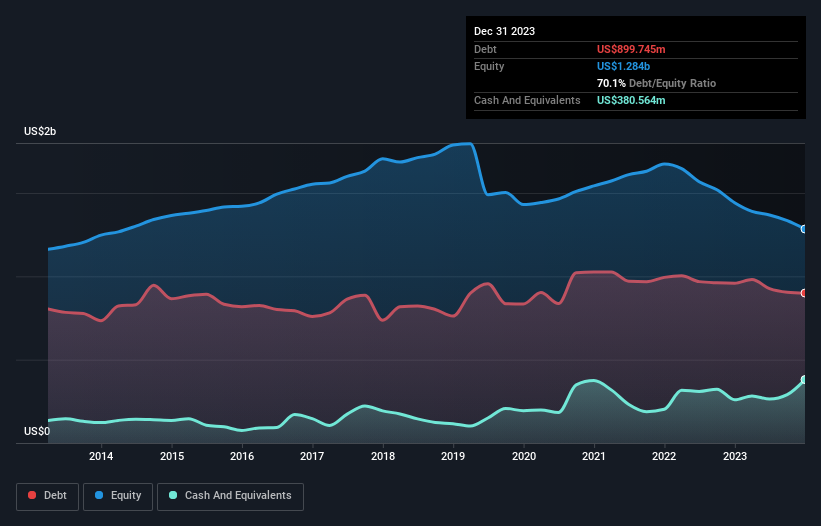Howard Marks put it nicely when he said that, rather than worrying about share price volatility, 'The possibility of permanent loss is the risk I worry about... and every practical investor I know worries about.' So it seems the smart money knows that debt - which is usually involved in bankruptcies - is a very important factor, when you assess how risky a company is. We note that Tutor Perini Corporation (NYSE:TPC) does have debt on its balance sheet. But the more important question is: how much risk is that debt creating?
Why Does Debt Bring Risk?
Debt is a tool to help businesses grow, but if a business is incapable of paying off its lenders, then it exists at their mercy. Part and parcel of capitalism is the process of 'creative destruction' where failed businesses are mercilessly liquidated by their bankers. However, a more common (but still painful) scenario is that it has to raise new equity capital at a low price, thus permanently diluting shareholders. Of course, debt can be an important tool in businesses, particularly capital heavy businesses. The first step when considering a company's debt levels is to consider its cash and debt together.
See our latest analysis for Tutor Perini
What Is Tutor Perini's Debt?
As you can see below, Tutor Perini had US$899.7m of debt at December 2023, down from US$958.4m a year prior. On the flip side, it has US$380.6m in cash leading to net debt of about US$519.2m.

How Strong Is Tutor Perini's Balance Sheet?
Zooming in on the latest balance sheet data, we can see that Tutor Perini had liabilities of US$2.12b due within 12 months and liabilities of US$1.02b due beyond that. On the other hand, it had cash of US$380.6m and US$2.78b worth of receivables due within a year. So its total liabilities are just about perfectly matched by its shorter-term, liquid assets.
This surplus suggests that Tutor Perini has a conservative balance sheet, and could probably eliminate its debt without much difficulty. There's no doubt that we learn most about debt from the balance sheet. But it is future earnings, more than anything, that will determine Tutor Perini's ability to maintain a healthy balance sheet going forward. So if you're focused on the future you can check out this free report showing analyst profit forecasts.
In the last year Tutor Perini wasn't profitable at an EBIT level, but managed to grow its revenue by 2.4%, to US$3.9b. We usually like to see faster growth from unprofitable companies, but each to their own.
Caveat Emptor
Over the last twelve months Tutor Perini produced an earnings before interest and tax (EBIT) loss. Indeed, it lost a very considerable US$115m at the EBIT level. On a more positive note, the company does have liquid assets, so it has a bit of time to improve its operations before the debt becomes an acute problem. But a profit would do more to inspire us to research the business more closely. This one is a bit too risky for our liking. When analysing debt levels, the balance sheet is the obvious place to start. But ultimately, every company can contain risks that exist outside of the balance sheet. To that end, you should be aware of the 2 warning signs we've spotted with Tutor Perini .
Of course, if you're the type of investor who prefers buying stocks without the burden of debt, then don't hesitate to discover our exclusive list of net cash growth stocks, today.
Valuation is complex, but we're here to simplify it.
Discover if Tutor Perini might be undervalued or overvalued with our detailed analysis, featuring fair value estimates, potential risks, dividends, insider trades, and its financial condition.
Access Free AnalysisHave feedback on this article? Concerned about the content? Get in touch with us directly. Alternatively, email editorial-team (at) simplywallst.com.
This article by Simply Wall St is general in nature. We provide commentary based on historical data and analyst forecasts only using an unbiased methodology and our articles are not intended to be financial advice. It does not constitute a recommendation to buy or sell any stock, and does not take account of your objectives, or your financial situation. We aim to bring you long-term focused analysis driven by fundamental data. Note that our analysis may not factor in the latest price-sensitive company announcements or qualitative material. Simply Wall St has no position in any stocks mentioned.
About NYSE:TPC
Tutor Perini
A construction company, provides diversified general contracting, construction management, and design-build services to private customers and public agencies worldwide.
Very undervalued with flawless balance sheet.
Similar Companies
Market Insights
Community Narratives



